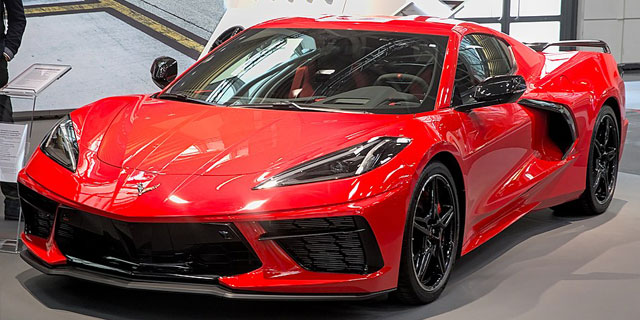The Effect of Volatile Economic Trading on Supercar Hire
What impact will an escalating trade war have on the supercar hire sector?

April 2025 witnessed a dramatic rewriting of global trade practices when the United States, under Donald Trump, introduced a series of sudden and sweeping tariff measures. How would these impact the long term sales of supercars and what effect would it have on supercar hire?
In order to address what he saw as an imbalance of trade, Trump declared a national emergency invoking the International Emergency Economic Powers Act (IEEPA) in order to impose a 10% import tariff on all goods entering the U.S. Then, starting on the 9th April an additional range of tariffs individualized on countries with what is believed to be substantial trade deficits with the U.S. These included a 20% tariff on imports from the European Union, directly targeting many of the major supercar makers such as Ferrari, Lamborghini and Porsche.
This triggered a swift response from their global trading partners, many of whom announced their own receptacle tariffs leading to what became a full scale trade war, severely spooking the financial markets with many experiencing sharp declines and investors expressing concerns over a potential recession and its implications for international economic stability.
What impact will this have on the Supercar market and in turn, the supercar hire sector?
The U.S. tariffs target all imported goods, including luxury goods such as supercars. This will have a significant ripple effect on supercar sales both in the U.S. and globally. This will likely mean:
Higher Prices for Imported Supercars in the U.S.
Tariffs will directly affect European based brands by hitting them with a 20% charge. Supercar makers in the U.K. including McLaren and Land Rover will be subject to a 10% charge. These tariffs would raise the import cost of each vehicle, and that cost would almost certainly be passed on to the consumer in the short term.
Longer term, this could result in a reduced demand for new supercars among U.S. buyers or a shift towards exploring the user supercar market. This in turn could increase prices for used cars which may well have an impact on the availability of certain models for supercar hire. Values at auctions and in private sales will rise, making collector’s items or lower mileage supercars even more desirable.
One part of the rationale behind the tariffs is to restore what is seen as a failing U.S. car manufacturing sector by encouraging U.S. consumers to move towards U.S. made supercars. This may well be the result, but supercar owners tend to be loyal to their brands, so there will be pressure on the U.S. to allow a certain flexibility when it comes to supercar imports.
Strategic Shift to U.S. Production Plants
To mitigate tariff impacts, manufacturers will consider moving some of their assembly operations to the U.S. Lamborghini for example have already suggested their eclectic vehicle range could be made with the United States.
Strategic Shift to New Markets
If supercar demand cools within the U.S., we will see makers start to redirect allocations and incentives to countries with more favorable trade terms, like the Middle East. There is often a waiting time for a new car, so this will allow makers to maximise sales in countries where the demand is high. U.S. consumers may well have to wait longer for their new cars.
Strategic Shift to New Markets
Will the Ferrari and Lamborghini owners in the U.S. readily embrace a Corvette Z06 or Dodge Challenger Demon 170? The U.S. has traditionally favoured muscle cars with raw power, big V8s, and brute straight-line speed. Think of the Mustangs, Corvettes and Challengers. European supercars lean toward precision engineering, subtle fluid design, and responsive track performance. Supercars in Europe are designed with handling and sophistication as a priority. In the U.S., it's more about brute force and value for money. They are very much two different customers. If the U.S. limits the import of European cars, will the U.S. manufacturers develop a more considered and desirable range to woo the Ferrari owners?
New Collector’s Markets
Supercar collectors will be looking at the market turmoil and sensing an opportunity. If there is a reduced number of European and U.K. cars entering the U.S., then certain models will become valuable over time. Any low production supercar already holds a premium and this will explode once availability becomes an issue.
How might individual supercar makers respond to the tariffs?
As mentioned, Lamborghini may look to build their new EV models in the U.S. They are now owned by the VW Group who might see it as an opportunity to placate the U.S. and then allow a deal to be made on their other marques.
Ferrari would likely have to absorb some of the tariff costs to avoid pricing themselves out of the U.S. market entirely, as they’re heavily dependent on U.S. sales. They are one maker who will definitely be looking at widening their involvement in other markets, ensuring their dealerships can offer the best deals in parts of Asia and the Middle East.
McLaren does not have the size of some supercar makers, so will really struggle to cope with a changing U.S. market. They, with Lamborghini, must surely be considering moving some aspects of their production to the U.S.
Porsche is also owned by the VW Group and they will be hoping to use their size to help obtain better deals on import tariffs. As things stand, this will be very much dependent on moving some production to the U.S. or waiting for the EU to broker a wider deal.
There will always be a strong U.S. market for supercars and this current trade war will be a short term interruption for dealers and consumers. The worry is how long it will continue and what impact that will have on global car sales. Any movement in supercar sales will have some impact on superhire prices over the long term. For now however, here at PB Supercars we have seen to need to panic and still offer a wide range of supercars for hire in London at the most affordable prices. Get in touch to see what we can offer you.










